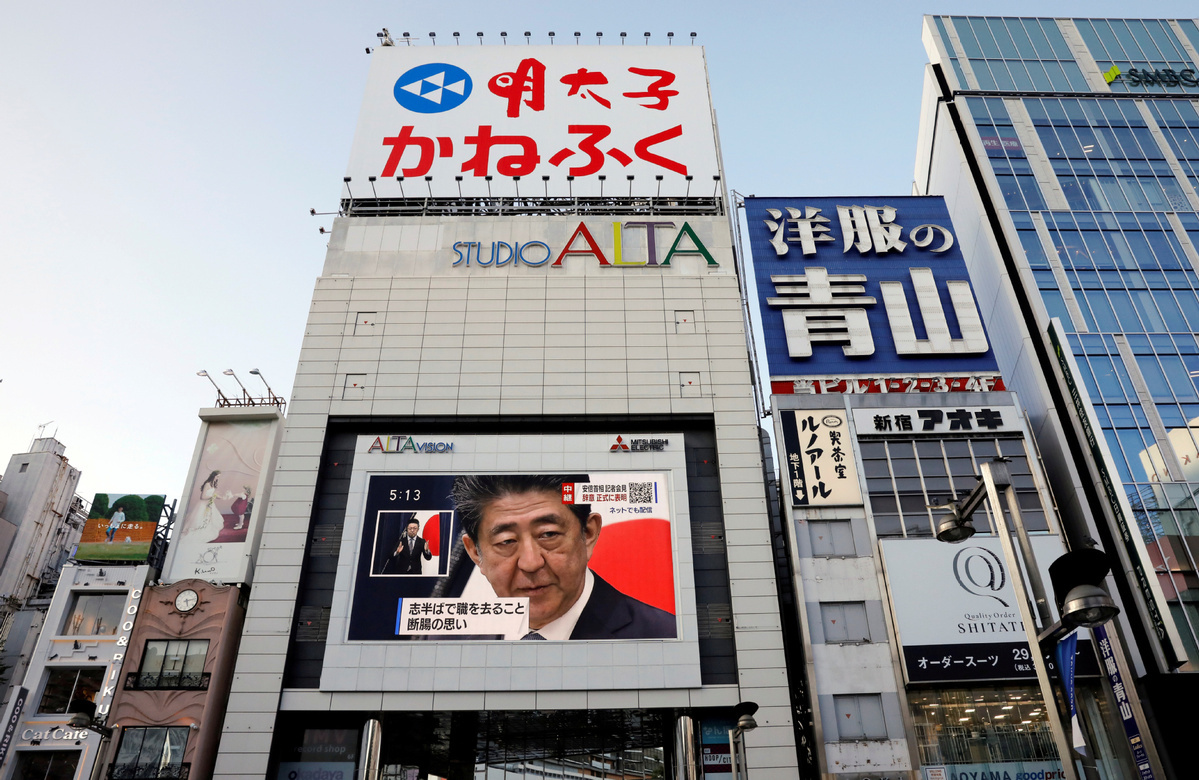TOKYO-Japan's ruling Liberal Democratic Party plans to hold a leadership vote on Sept 14 to replace Prime Minister Shinzo Abe, who is stepping down due to ill health, local media reported on Monday.

A news conference of Japanese Prime Minister Shinzo Abe is broadcasted in Tokyo, Japan, August 28, 2020. [Photo/Agencies]
The new party leader will become the country's next prime minister, due to the party's parliamentary majority, with four possible candidates vying for the position.
Abe, Japan's longest-serving premier, told US President Donald Trump earlier on Monday in a phone call that the strengthening of their two nations' alliance would be maintained even after he leaves office, a Japanese government spokesman said.
White House spokesman Judd Deere said in a statement that Trump told Abe he had done a "fantastic job" and that the relationship between their two countries was stronger than it has ever been.
But Abe's successor will face a daunting list of economic, diplomatic and security issues.
In the race to succeed Abe as the next prime minister, former defense minister Shigeru Ishiba is the most popular choice among the public, opinion polls showed.
Uphill battle
But Ishiba, a vocal Abe critic, could face an uphill battle if he does declare his candidacy, with media reporting Chief Cabinet Secretary Yoshihide Suga was set to receive the backing of several major factions within the ruling Liberal Democratic Party.
Ishiba has about 34 percent of the public's support, more than double the 14 percent for Suga, the second-most popular choice, a weekend Kyodo News survey showed.
A Nikkei/TV Tokyo poll showed Ishiba with 28 percent support, followed by current Defense Minister Taro Kono with 15 percent. Suga came in fourth place with nearly 11 percent, the poll showed.
The surveys highlight a split between public opinion and internal LDP politics.
Suga-a longtime lieutenant of Abe's in a key supporting role-will join the race to replace his boss with support expected from the faction led by LDP Secretary-General Toshihiro Nikai and other major factions, putting him in a favorable position.
Suga declined to comment on Monday when asked about the LDP leadership race at his regular news conference as the government's top spokesman.
Ishiba, who unsuccessfully challenged the outgoing premier in the last LDP leadership race in 2018, has yet to declare whether he will run. He is considered less popular within the party.
Fumio Kishida, LDP's policy chief, who has announced his intention to stand, came in last place in both of the public opinion surveys.
Brad Glosserman, deputy director of the Center for Rule-Making Strategies at Tama University, said Suga was the safe bet in terms of internal LDP dynamics, but might not be ideal come election time. A general election must be held by late October 2021.
Japan does not elect its leader by direct popular vote. Under the country's parliamentary political system, lawmakers elect a prime minister.
That means the LDP president is virtually guaranteed to become prime minister because of the party's majority in the lower house of parliament.


